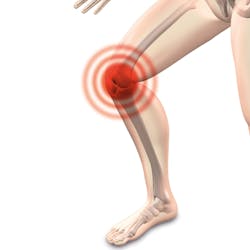The U.S. Food and Drug Administration (FDA) granted marketing authorization – under the De Novo premarket review pathway – for an anterior cruciate ligament (ACL) implant, intended to serve as an alternative to ACL reconstruction to treat ACL tears, according to a press release from the agency.
The device, the Bridge-Enhanced ACL Repair (BEAR) Implant, unlike traditional reconstruction, does not require the use of harvested tendons for ACL repair and is the only currently available alternative to reconstruction with allograft, autograft or suture-only repair for the treatment of ACL rupture, according to the FDA.
The ACL, a ligament stretching from the front to the back of the knee, aids in keeping the knee stable. Despite being a very common injury, the only surgical treatment available before this approval for torn ACLs has been ACL reconstruction using allograft, autograft or suture-only repair.
The BEAR Implant is a resorbable implant – meaning it is absorbed by the body – made from bovine collagen and is secured via suture to bridge the gap between the torn ends of a patient’s ACL. The patient’s own blood is injected into the implant during the surgical implantation procedure with the intent of forming a device-protected clot that enables the body’s healing process. Within about eight weeks of the BEAR Implant surgical procedure, it is absorbed and replaced by the body’s own tissue.
The FDA assessed the safety and effectiveness of the BEAR Implant in a randomized controlled trial of 100 subjects with complete ACL rupture. In the study, 65 patients received the BEAR Implant and 35 members of the control group received ACL reconstruction with autograft (using their own tendon from another part of the body). Patients received physical therapy and were followed for two years. At the two-year mark, patients who received the BEAR Implant reported an average score of 88.6 and control subjects reported an average score of 84.6 using the International Knee Documentation Committee Subjective Score, a patient-reported outcome measure (questionnaire) that asks questions about symptoms related to pain and stiffness, sports activity and knee function.
The patients also underwent arthrometry, a noninvasive measurement of laxity, or looseness, of the knee joint. Arthrometry measures the difference in laxity between a person’s healthy leg and their injured leg.
The FDA reviewed the BEAR Implant through the De Novo premarket review pathway, a regulatory pathway for low- to moderate-risk devices of a new type.
The FDA granted the marketing authorization to Miach Orthopaedics.

